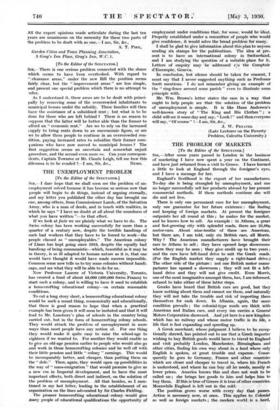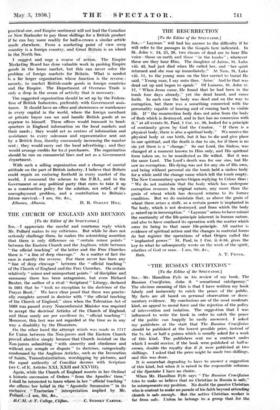THE PROBLEM OF MARKETS
[To the Editor of the SPECTATOR.] SIR,—After some years passed in'London in the business of marketing I have now spent a year on the Continent, and have just returned from a visit to Greece. I have learned a little to look at England through the foreigner's eyes, and I have a message for her.
England's livelihood is the export of her manufactures. To-day she is being strangled by unemployment, and can no longer successfully sell her products abroad by her present commercial methods. If these methods continue she will die and not live.
There is only one permanent cure for her unemployment, only one guarantee for her future existence : the finding and keeping of foreign markets. At present the foreigner outpoints her all round at this ; he makes for the market, and he 'mows how to sell. An example : in Athens, a great and fast-growing city with splendid roads, there are 25,000 motor-ears. About nine-tenths of these are American, but there are, I am told, only six British cars, all Morris. Why ? The American manufacturers have brought their cars to Athens to sell ; they have opened large showrooms where they may be seen ; they give credit up to two years ; and the cars have left-hand drive to suit the Greek roads. (For the English market they supply a right-hand drive.) The other side of the picture': not one British motor manu- facturer has opened a showroom ; they will not fit a left- hand drive and they will not give credit. Even Morris, one of the most imaginative amongst them, has,-I am informed, refused to take either of these latter steps.
Greeks have heard that British ears arc good, but they know nothing about them and cannot see them, and naturally they will not take the trouble and risk of importing them themselves for cash down. In Albania, again, the same condition prevails ; the colonial-type roads are thick with American and Italian cars, and every inn carries a General Motors Corporation showcard. And yet here is a new kingdom which has no railway and whose motor traffic is its life, a life that is fast expanding and speeding up.
A Greek merchant, whose judgment I believe to be excep- tionally shrewd, has pointed out to me that a Greek importer wishing to buy British goods would have to travel to England and visit probably London, Manchester, Birmingham and other cities, finding his own way about in a land where only English is spoken, at great trouble and expense. Conse- quently he goes to Germany, France and other countries which are closer and cheaper to travel in, where his French is understood, and where he can buy all he needs, mostly at lower prices. America knows this and does not wait to be called on ; she brings her goods to him and helps him to buy them. If this is true of Greece it is true of other countries. Meanwhile England is left out in the cold.
The position grows worse with every day that passes. Action is necessary now, at once. This applies to Colonial as well as foreign markets ; the modern world is a hard,
practical one, and Empire sentiment will not lead the Canadian or New Zealander to pay three shillings for a British product if he can buy more readily for half-a-crown a similar article made ,elsewhere. From a marketing point of view every country is a foreign country, and Great Britain is an island In the worth Se-a.
:I _suggest and urge a. course of action. The Empire Marketing Board has done valuable work in pushing Empire goods in the home market, but this can .never solve the problem of foreign markets for Britain. What is needed is -a far- larger organization whose function is the reverse,: namely, to market British-made goods in foreign countries and the -Empire. The Department of _Overseas. Trade is only a drop in the ocean of activity that is necessary..
The suggested organization should be set up by the Federa- tion of British Industries, preferably with Government assis- tance. - It should have an office and,showrooms or warehouses in every capital in the world, where the foreign merchant or -private buyer can see and handle British goods at no expense to himself. These offices would transmit to head- quarters in England information on the local markets and their needs ; they would act as centres of information and assistance to every salesman and representative sent out by a British firm, thereby enormously increasing the number sent ; they would carry out the local advertising ; and they would arrange credits for- local purchasers. The organization should be run on ,commercial lines and not as a Government department. .
With such a selling organization and a change of mental attitude on -the part of British industry,: I believe that Britain could regain an enduring foothold in every market of the world... I commend: the scheme to the F.B.I., and to the Government or. any political party that cares to take it up as a constructive policy for the solution, not relief, of the unemployment problem, and a contribution to Britain's future survival.—I am, Sir, &c.,















































 Previous page
Previous page